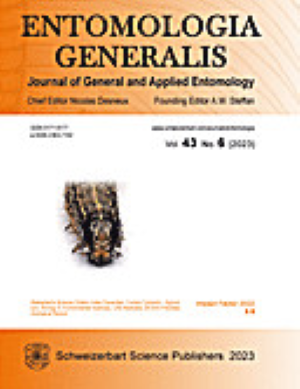两种感染番茄的乞蛾病毒共存对烟粉虱病毒感染和病媒传播的影响
IF 4.6
1区 农林科学
Q1 ENTOMOLOGY
引用次数: 0
摘要
在多种病毒流行的农田里,植物通常会同时感染多种病毒。粉虱是植物病毒的传播媒介,它们可以通过先后探查两株受感染的植物或在一株受共同感染的植物上获得两种病毒。虽然共同载体共感染两种病毒会影响载体传播和病毒流行,但这些影响仍需要更全面的研究。在本研究中,我们调查了两种乞巧病毒共存对烟粉虱中东-亚洲小1号(MEAM1)病毒感染的影响。通过取食感染了台湾番茄卷叶病毒(ToLCTV)、泰国番茄黄叶卷叶病毒(TYLCTHV)或两种病毒的植株,粉虱经历了两个连续的获取期。通过实时定量聚合酶链式反应测定了粉虱中肠、血淋巴、初级唾液腺和唾液中的病毒含量。我们还进行了传播试验,以评估 ToLCTV 和 TYLCTHV 共存对粉虱介导的两种病毒传播的影响。我们的结果表明,TYLCTHV的前摄食对ToLCTV在粉虱中肠的感染具有拮抗作用。无论摄入顺序如何,TYLCTHV 在粉虱中肠、血淋巴、PSGs 和唾液中的含量及其传播率均高于 ToLCTV。这项研究为了解两种番茄乞猴病毒(ToLCTV 和 TYLCTHV)在烟粉虱体内的复杂相互作用提供了宝贵的见解,并加深了我们对病毒-病毒-媒介三方复杂相互作用关系及其对植物病毒传播影响的理解。本文章由计算机程序翻译,如有差异,请以英文原文为准。
Impacts of coingesting two tomato-infecting begomoviruses on virus infection in Bemisia tabaci and vector transmission
In agricultural fields where many viruses are prevalent, plants are commonly coinfected with multiple viruses. Whiteflies, vectors of plant viruses, can acquire two viruses by probing on two infected plants sequentially or on a coinfected plant. Although the coingestion of two viruses by a common vector is supposed to influence vector transmission and virus epidemiology, these effects still require more comprehensive research. In this study, we investigated the impact of coingesting two begomoviruses on virus infection in Bemisia tabaci Middle East–Asia Minor 1 (MEAM1). Whiteflies underwent two successive acquisition access periods through feeding on plants infected with tomato leaf curl Taiwan virus (ToLCTV), tomato yellow leaf curl Thailand virus (TYLCTHV), or both. The amounts of virus in the midgut, hemolymph, primary salivary glands (PSGs), and saliva of the whiteflies were determined through quantitative real-time polymerase chain reaction. Transmission assays were conducted to evaluate the impact of coingesting ToLCTV and TYLCTHV on the whitefly-mediated transmission of both viruses. Our results revealed that the preingestion of TYLCTHV was antagonistic to the infection of ToLCTV in the whitefly midgut. Regardless of the ingestion sequence, the amounts of TYLCTHV in the midgut, hemolymph, PSGs, and saliva of whitefly, as well as its transmission rate, were higher than those of ToLCTV. This study provides valuable insights into the intricate interactions between two tomato begomoviruses (ToLCTV and TYLCTHV) within B. tabaci and improves our understanding of the complex tripartite interplay involving virus–virus–vector relationships and the implications for plant virus transmission.
求助全文
通过发布文献求助,成功后即可免费获取论文全文。
去求助
来源期刊

Entomologia Generalis
生物-昆虫学
CiteScore
7.10
自引率
18.80%
发文量
72
审稿时长
>12 weeks
期刊介绍:
Its scope covers all aspects of basic and applied research dealing with insects and more broadly with arthropods inhabiting wild, agricultural and/or urban habitats. The journal also considers research integrating various disciplines and issues within the broad field of entomology and ecology.
Entomologia Generalis publishes high quality research articles on advances in knowledge on the ecology and biology of arthropods, as well as on their importance for key ecosystems services, e.g. as biological control and pollination. The journal devotes special attention to contributions providing significant advances (i) on the fundamental knowledge and on sustainable control strategies of arthropod pests (including of stored products) and vectors of diseases, (ii) on the biology and ecology of beneficial arthropods, (iii) on the spread and impact of invasive pests, and (iv) on potential side effects of pest management methods.
Entomologia Generalis welcomes review articles on significant developments in the field of entomology. These are usually invited by the editorial board, but proposals may be sent to the Editor-in-Chief for preliminary assessment by the editorial board before formal submission to the journal. The journal also considers comments on papers published in Entomologia Generalis, as well as short notes on topics that are of broader interest.
 求助内容:
求助内容: 应助结果提醒方式:
应助结果提醒方式:


